Trench art may be a little-known piece of history, but there is no doubting that these phenomenal objects need to be admired.
Trench art is a broad term given to the creative pursuits of people in war time. It can be made from a wide variety of debris found in a warzone. This can include anything from ammunition shell cases, bullet casings, shrapnel, and pieces of destroyed buildings or downed planes. Trench art is often associated with World War I but beautiful objects have been made in many conflicts around the world.
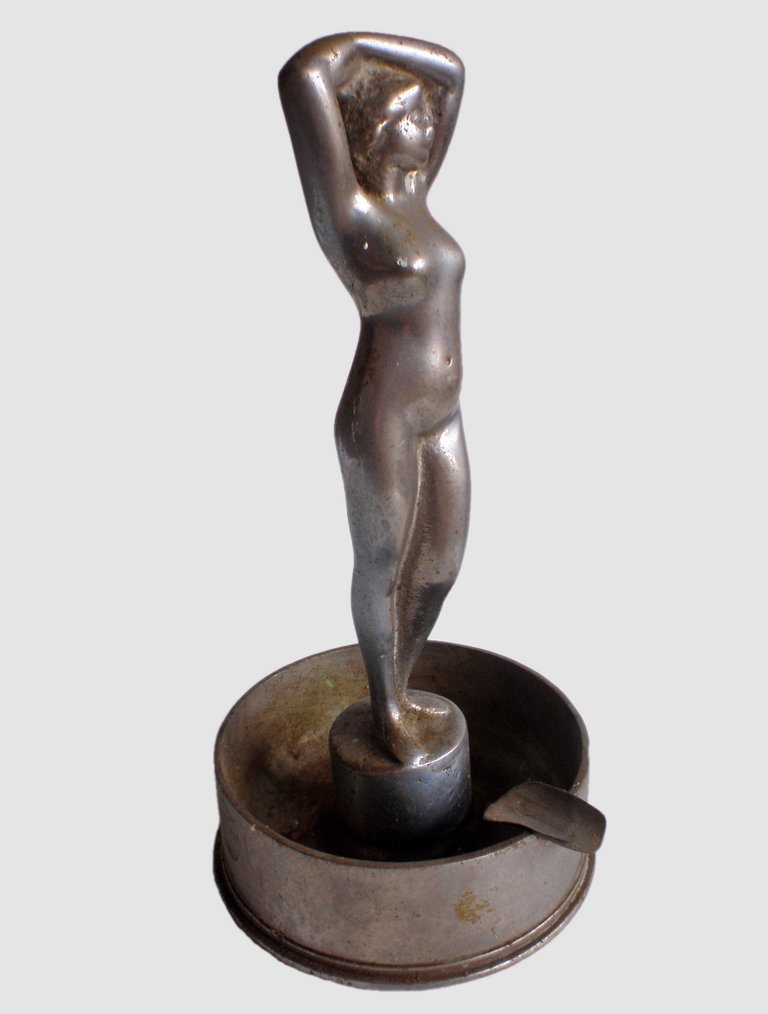
A World War II era ashtray crafted from a 25-pounder shell case, dated 1942.

The regimental crest of the Princess Patrica’s Canadian Light Infantry is seen in this carved rifle butt, a souvenir of the First World War.
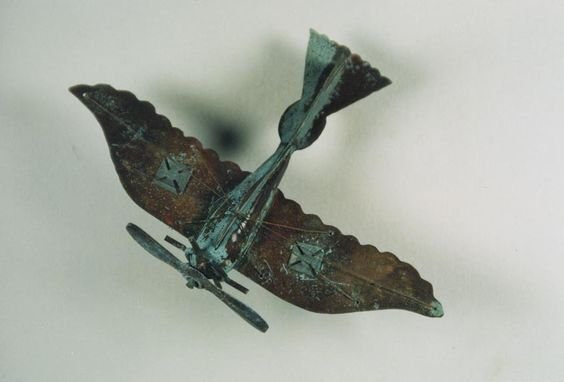
Model of the most beautiful WWI airplane, the German Taube [Dove]. Made from scrap copper and copper wire. Iron crosses on wings and moveable propeller.

Corporal Frank Alexander Cameron of Barrie, Ontario was a signaller with the 2nd Canadian Division. In his spare time, Cameron crafted a four-piece tea set for his mother, sending each piece home as it was completed. The materials include British 13- and 18-pounder shell cases, a French 75 mm case, and French rifle bullets.

This shell was engraved by a British soldier. The design was taken from a stencil, which was purchased from a Belgian soldier for five Woodbine cigarettes. The design was transferred to the shell case using iodine. A bent nail was then used to engrave the design into the metal.

Sergeant Roland Percy Salt of the 8th Brigade, Canadian Field Artillery, created this piece of trench art in 1917. The ornately designed candlestick holder was made from an 18-pounder shell casing.

Painted American military helmet from 'Victory' Division the 95th. Probably done at the end of WWII, it features the Disney characters Donald Duck and Goofy.
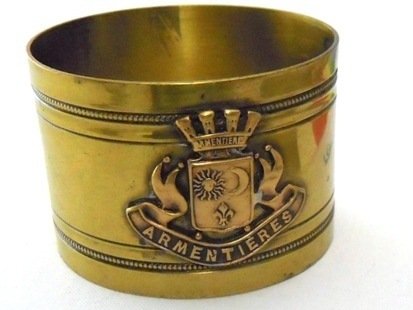
This serviette ring was made in France from recycled brass and brought back as a gift to the soldier’s young sister.
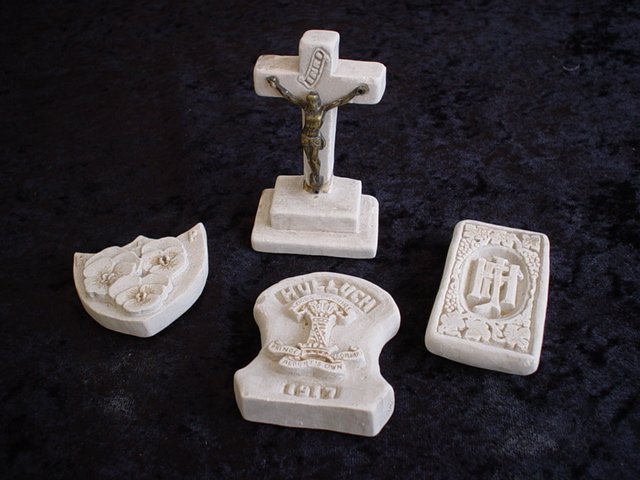
These items were carved from chalk by a soldier in the Leicester Yeomanry while he was at Hulluch, near Loos.

A British 13-pounder shell case, worked into an engraved tobacco jar by Turkish prisoners of war in the Middle East. The man who decorated it evidently possessed considerable metalworking skills; it is elaborately engraved with Islamic decorative motifs and calligraphy.
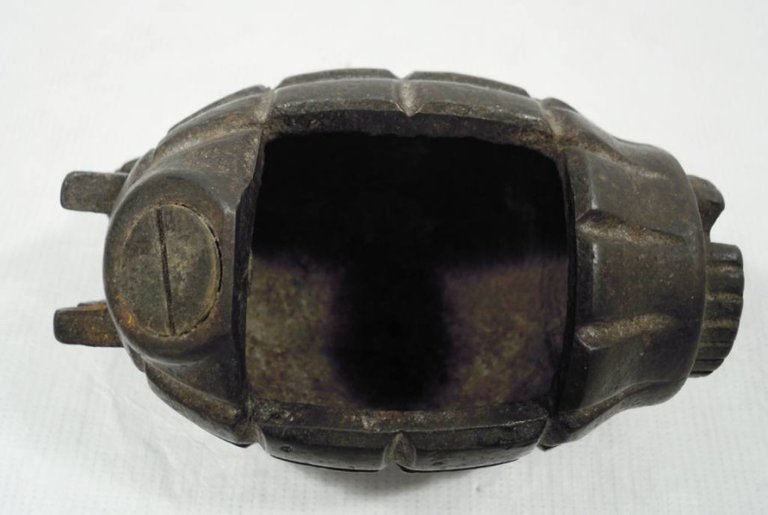
This ashtray is made out of a Mills 36M grenade. The cast iron ‘pineapple-style’ body of the grenade provides the bowl to collect the ash.

A handmade lighter made from a German cartridge case.
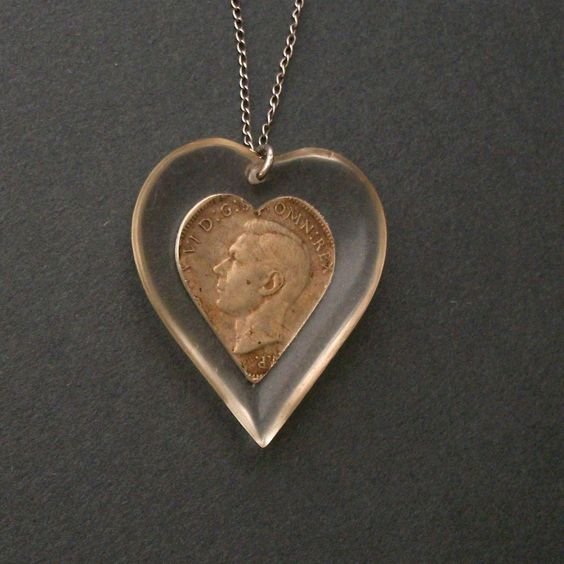
WWII Trench Art pendant necklace from New Guinea, 1944. Made by an Australian soldier, using the tools and materials at hand. A heart filed out of a threepence coin, framing the face of King George VI like a cameo.

Trench art jug created by a sapper in the Royal Engineers whilst he was manning an underground telephone exchange in the Ypres district during the First World War. The jug was made from a British 18-pounder Mark II brass shell case.

Captain Ernest Edward Davis brought this ink well, or trench art, home. It is comprised of a painted No. 5 Mills bomb, with bullets and rifle casings screwed into a metal plate.

Australian WWI period neatly carved bone 195mm high "From Stobs Camp 1915" mounted on timber stand.

WWI plane made from a bullet and cartridge case and it has both rotating wheels and propeller as well as rigging and a detailed rotary engine. The wings have been decorated with the names of the Belgian towns of Nieuport and Coxyde.
Sources
http://www.iwm.org.uk/history/beauty-from-the-battlefield-10-pieces-of-trench-art#entry9
https://www.armymuseum.co.nz/whats-on/world-war-one-centenary/personal-treasures-wwi-trench-art/
https://medium.com/war-is-boring/the-haunting-beauty-of-trench-art-c8f0966378d8
http://ww1.canada.com/battlefront/images-trench-art-transformed-symbols-of-death-into-items-of-beauty
http://www.trenchart.co.uk/default.html
Wonderful art .Excellent post.go ahead bro.best of luck.
thanks. I think its amazing how talented some of these people were. and they say that it was therapeutic to do the art.
Wow that's very interesting. Great writing too. Thanks for sharing
You're welcome! thanks for reading